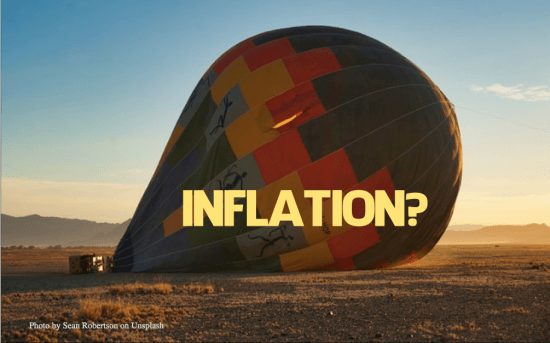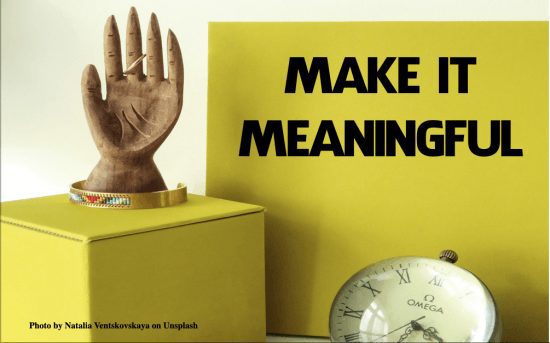The outlook for business is laced with dark clouds
Over the past two years, governments have printed extraordinary sums of money to “buoy” the economy. In the process, the trend toward bigger government continues inexorably onward. In some countries, the government spending has drained available talent from the private sphere. Somehow, the big idea is that a country can’t fail and that government is better at driving the economy than business. Can we just print our way out of trouble? Many things have already gone awry with the solution. Importantly, there are plenty of signals that the future will be far more challenging than people anticipate. Bottom line, it’s gonna get messy! In this post, I look at the big question marks and propose a path for business leaders to take.

What’s gone wrong already?
Things have already gotten rather messy, wouldn’t you say? Evidently, people aren’t as keen to work as they used to be. Whether it’s the effect of having to live at home “locked down”, having had too much time to ponder what life’s all about, the preferred life of living in the ‘comfort’ of a furlough, a burgeoning lack of engagement at work or some other phenomenon, we’ve seen that many people aren’t rushing back to work. In the US, we’re talking about the Great Resignation where people are voluntarily leaving their jobs in droves, despite not having another job. People are sleeping worse and mental healthy issues are spawning at record levels. In Canada, where unemployment is at a 20-month low (6.7%) [source: CTV], it was reported that nearly one out of every five Canadians resigned from their job during the pandemic due to increased mental stress/strain at work [source: Lifeworks]. In the US, unemployment is at 4.6% [source: Reuters] relatively close to the previously “hot” market pre-pandemic level of 4%, and yet there are 10 million unfilled positions. In the UK, unemployment sits at 4.5% [source: Reuters]. A low unemployment rate bodes badly for business, at least for those that are planning to hire new staff. First, employers are struggling to find people, much less qualified talent. This will put upward pressure on wages. Secondly, employers are still having to enforce precautionary measures (against Covid) that assuredly are making the cost of business more expensive. Thirdly, employers are having to offer more flexible work conditions, now that everyone has miraculously discovered that remote work is possible. Remote and/or hybrid work conditions are much harder to manage when it’s a matter of choice (as opposed to being mandated). This will be particularly challenging for legacy in-office businesses.
What might further inflate our worries?
And it gets worse. We face multiple other issues in business at the macro level. Not forgetting climate change issues and the pressure to have more diversity and inclusion in the workplace, there are some significant black clouds overhanging. I believe that the context is so unique that prior experience and theories will not provide sufficient guidance to get through this new phase. There are four points that make it especially hard to predict what will happen over the next 24 months.
1/ Are the inflation indices accurate?
The biggest overhanging question mark is inflation. The latest Consumer Price Index (CPI) figures are all higher than is customary [source: Global Rates] and, importantly, higher than what is generally considered healthy:

- US 6.2% (October)
- Canada 4.7% (October)
- Germany 4.5% (October)
- UK 3.1% (September) [source: ONS]
Will the various Central Banks be able to manage inflation or will we start to see run-away increases? It’s worth noting that the way that inflation is measured in each country is, by definition, different since each country’s basket of goods & services is specific. And, as argued by Mark Mobius in his 2020 book, The Inflation Myth and the Wonderful World of Deflation, are we really capable of measuring the value of money and inflation in light of the massive changes in our lives and gains in productivity brought through the avalanche of new technologies? Between the Amazon effect, the plethora of price comparison sites and the way we have re-prioritized our purchases (e.g. our smartphone budget), the indices are probably outdated. Consumption patterns are undergoing seismic change and businesses are coming up with innovative ways to exploit these new technologies. Companies will need to be hyper vigilant with their pricing because of both rising costs and forex variations.
2/ Will the indebted piper come a calling?
We have been talking about swollen debt levels in many developed countries for decades and yet haven’t seen real repercussions (esp in the US). In the wake of massive spending programs to revive the national economies during the pandemic, where governments have been liberally printing record amounts of money, will there really be no negative consequence? Can all this money really be free? Or is the interdependency among the developed countries so intertwined that we can sweep the debt levels under the proverbial carpet? Is this perhaps the secret outcome of globalization? From my reading, the investments in infrastructure may well be welcome, but to what extent can politicians and governments be expected to spend that money wisely and efficiently? Moreover, there seem to be signs that the massive public spending is tightening the labor market. We’re also experiencing significant setbacks on logistics (cf. a lack of warehousing availability, sky-rocketing container rates, port congestion and a shortage of lorry drivers). The tipping point will come when the impositions (ie. taxes) become so high that they kill the incentive for private investment. One thing is for sure: big government does not lead to innovation.
3 / How will immigration evolve?
A lack of local people available or willing to do the grunt or menial work in the developed countries is usually answered by immigrants. But this is another slippery topic. Whether because of economic, demographic or climate change reasons, the West is going to have to deal with immigration at a whole new level. In a context of rising nationalism and/or autocracy in many significant countries, a contentious stand-off appears predictable. Certain agencies put the number of people worldwide who fell into extreme poverty through this pandemic at around 120 million [source World Bank]. The split between the have and have nots is not just within the countries in the developed world, it’s also widening between the poorest countries and the richest countries. We’ve already seen many instances where immigration has caused friction (e.g. Belarus/Poland, Calais/UK, Mexico/US…). Definitively, not every immigrant is the same. We can expect the issue of immigration to get more complex. I suspect the burgeoning immigration crisis will wreck havoc on the political front. But the net net for business — especially in countries where the demographics point to an aging population — will be a fierce competition for talent… at an affordable price. In any event, in a world where employees can potentially work from anywhere, it behoves management to create a welcome space for people coming with diverse mindsets and backgrounds.
4/ Working for funny money

There’s a saying that to find the answer, just follow the money. But money is moving in much stranger ways these days, so it’s harder to follow. With all the new payment possibilities through technology, there are myriad strategic questions that bankers, CFO’s and regulatory bodies are needing to pose. On a backdrop of inflationary risks and questionable economic growth, how will the major currencies be affected? Between the US Dollar, Euro and Yuan, the battle rages as to which currency will be king of the heap. Gold remains important, but will the cyber-currencies — that today represent around 5% of the money in circulation [source Investopedia] — destabilize the state of play? Which money will be the standard in the future? For global players, the forex situation will make earnings predictions evermore difficult.
Consequences for business!
The consequences of inflationary pressures, ever bigger government, divisive politics and weakening currencies will mean that business leaders will need to have a solid constitution, a reinforced North Star and a deft agility to adapt to the new landscape coming out of the pandemic. With a solid North Star, you’ll be emboldened to weigh in on the appropriate political issues. I believe that, while difficult and risky, you will want to lean in on the political debate, assuming you are credible and your organization and key stakeholders are behind you. Meanwhile, here are the three orientations to navigate your business through the challenging darker clouds ahead:
1/ There’s a need for a new style of leadership
Faced with the above context, there is one huge message that needs to get through to all employers: managing in the old-fashioned manner is well and truly over. In certain industries, the resistance to change can still be compensated for through a higher salary offer (ex: financial services). But throwing money at the problem is not the best long-term solution. As I argue in You Lead, leaders need to be prepared to bring a fuller version of themselves to work, replete with their personal stories and ethics. For starters, leaders need to genuinely model the language and behaviors they want to see throughout the organization. In the quest for better talent, current and prospective employees will want to know that they can trust their leadership teams. Equally, leaders will need to create a dynamic where they can trust their employees, too, and given them the autonomy and space to do what’s needed to create customer delight. With so much hidden in the black box of artificial intelligence (AI) and automated algorithms, the new leader will know how to provide a compass and set a direction where each person knows why and how they are contributing not just to the business, but to making the world (at least slightly) better off. Creating a culture that is united around an uplifting purpose will be vital to making the customer experience better. The strongest companies will follow the inside-out model where the brand’s number one fans are its employees. As Philip Kotler exposed in his book, Marketing 3.0 (published in 2010), culture — as in the policies, procedures, language, rituals and behavior within the business — is the new marketing. And that means getting the employees on board in a genuine and authentic way, where HR policies and practices are in tune with the customer facing policies and methods. Ultimately, if the business purpose and culture is to function at the highest level, each employee will know why they are working at the specific company and how their work is contributing to their own sense of fulfilment. If not, as Marx so accurately described in the mid-nineteenth century, employees will bound to experience a sense of alienation.
Funny Money. It's Not That Funny, Is It? Culture — as in the policies, procedures, language, rituals and behavior within the business — is the new marketing. Share on X2/ Insert meaningfulness into daily business

Given the battle for personnel and the existential crisis that many have experienced, having demonstrably solid ethics and a sense of community will be vital to attract and retain talent that is more engaged and is prepared to deploy its discretionary energy. In Futureproof, Caleb and I wrote about the five ways to create meaningfulness in business. Coming out of the pandemic and moving into this messier future, the real leadership challenge – and that which will separate the leaders from the stragglers – will be to find, hire and retain motivated staff. To do this, you will need to create a more rewarding culture, with a de facto purpose to which the company’s employees relate and a sense that each employee can contribute in a meaningful manner.
3/ Check your ethical framework
In the tension between globalization and protectionism, the reach, scope and scale of the big tech companies has accelerated the notion of surveillance. Whether or not it’s state-sponsored or coordinated, and whether we like it or not, we are all basically tagged and traced now. Our sense of privacy and freedoms have been dramatically impacted. And the ethics of corporations (especially big tech) are being evermore scrutinized by regulatory bodies, some investigative media as well as by one’s own employees. Considering the pervasiveness of the big tech players, governments are struggling to come up with an appropriate regulatory framework. For business leaders, it will be important not to wait for governments to lay down the law, and to establish a policy and ethical framework that will help guide the use of technology, in particular of artificial intelligence initiatives. There are clearly loopholes in the laws; but just because it’s not illegal, doesn’t mean that it’s good.
Get your team humming to a new tune
The time for funny money is over. The furloughs are/have come to term. Tougher times lie ahead. Executive teams (and I’d argue investors too) will need to lean into a new form of leadership that promotes a healthier form of management, a culture where everyone knows how and why they are contributing and that has a transparent ethical framework, all the way down through any accompanying AI or algorithms. It’s a culture that allows for more personality and imperfection within the professional space, the courage to identify what (and who) does and doesn’t belong, and having everyone within you ecosystem and value chain believing that the world would be worse off if you (the company) didn’t exist. That’s the tune you and your team need to be humming.











